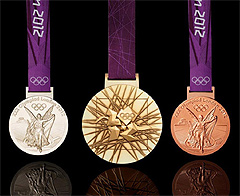 by Chris Banescu –
by Chris Banescu –
What better way for the U.S. government to “thank” our Olympic athletes for all the years of hard work, enormous efforts, and many personal and financial sacrifices in pursuit of excellence, than to compel them to pay taxes on their Olympic medals and prize money. Yes, my fellow Americans, U.S. Olympians must pay income taxes on both the medals and the prize money granted for gold, silver, and bronze.
Besides the actual gold, silver, and bronze medals given to the top three Olympians in each event, prizes are also awarded. For the London Olympics athletes receive $25,000 for gold, $15,000 for silver, and $10,000 for bronze.
According to the IRS, American medalists must report as income not only their prize money but also the market value of the actual metal in each medal they win. As Americans for Tax Reform explains, based on current commodity prices, a gold medal is worth approximately $675, a silver medal is worth about $385, and a bronze medal is worth under $5. With a top tax rate of 35%, here’s how much U.S. Olympic medal winners may have to pay in federal income taxes to the IRS, and that’s before additional state income taxes may also be due:
| Medal | Medal Tax | Prize Tax | Total Federal Tax |
| Gold | $236 | $8,750 | $8,986 |
| Silver | $135 | $5,250 | $5,385 |
| Bronze | $2 | $3,500 | $3,502 |
U.S. gold medal winners will owe the IRS up to $8,986 in taxes. Silver medal winners will owe up to $5,385. Bronze medal winners will owe up to $3,502. Granted, not all American Olympians will be taxed at the highest rate, but for many who earn other income this is certainly a strong possibility. And if they are residents of a U.S. state that has an income tax, these hardworking athletes will have to pay even more income taxes on their prizes.
California for example has a marginal tax rate of 9.3%. This means that Olympians from California will face an even more outrageous tax bill. In addition to the federal taxes they would owe, gold medal winners will have to pay another $2,387 in California income taxes. Silver medal winners will pay $1,407. Bronze medal winners will pay $930.
To add insult to injury, the IRS’ insidious tax policies put American athletes at a further disadvantage.
Not only do our Olympic athletes have to pay taxes on their medals and prizes – chances are their competitors on the field will face no such taxation when they get home. Because the U.S. is virtually the only developed nation that taxes “worldwide” income earned overseas by its taxpayers, our Olympic athletes face a competitive disadvantage that has nothing to do with sports.




What is the truth, though, about who really pays the Olympian’s tax bill? Doesn’t it get paid by the sponsors. I am guessing that the athletes themselves don’t feel any financial burden, although I do not endorse the taxes overall.
Couple of issues with that assumption. First, not all athletes have sponsors. Second, the taxes paid on behalf of the athletes are also “taxable income” as defined by the IRS. There is no way around the punitive U.S. tax code.
Here’s an important clarification about the U.S. taxation of worldwide income issue. The U.S. is indeed different than most other developed nations.
Chris, Please check Snopes–Tax on Olympic Medals. Not all of your facts are true. Bacu
Actually, everything I wrote is accurate and true. I specifically stated that “Granted, not all American Olympians will be taxed at the highest rate, but for many who earn other income this is certainly a strong possibility.”
I also very clearly wrote “will owe up to” in regards to the potential federal tax liability an athlete may face.
The Snopes article does not contradict anything I have written.
Furthermore, the Snopes piece conveniently ignores the State Income Taxes athletes will also have to deal with. So much for “accuracy” and “truth” from them!
ATR’s response to a Politifact fact check on Olympics and taxes.
http://atr.org/responding-politifact-olympics-taxes-a7101